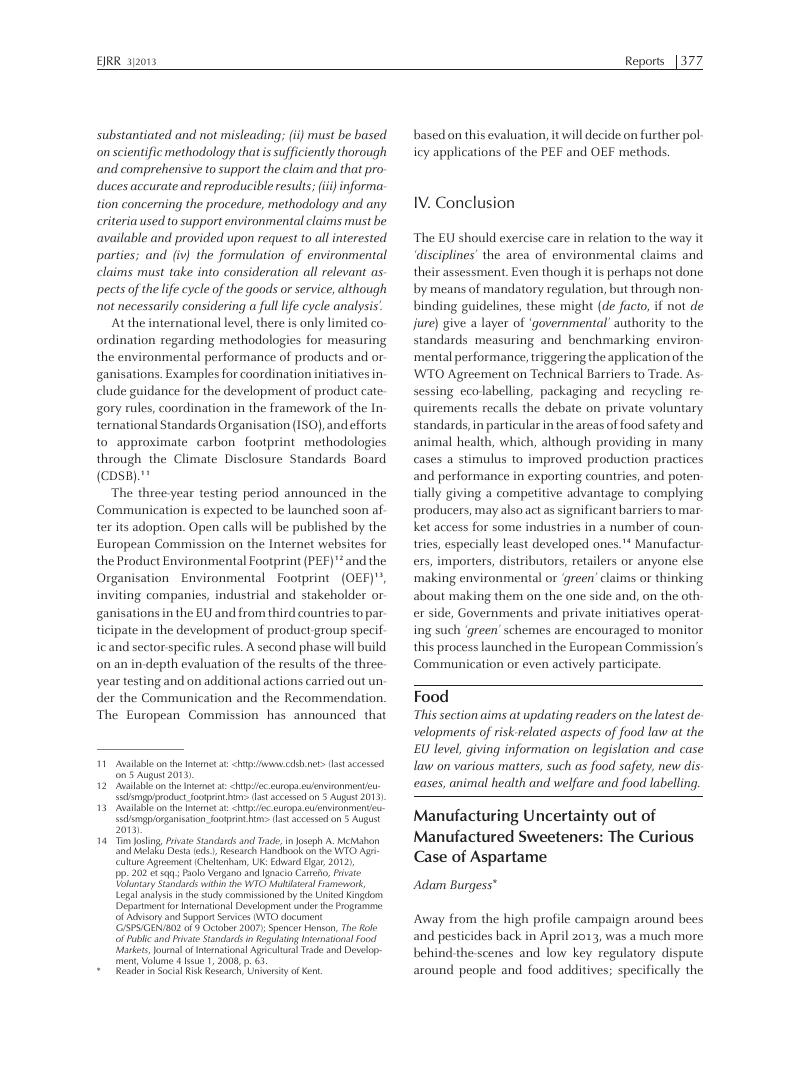No CrossRef data available.
Article contents
Manufacturing Uncertainty out of Manufactured Sweeteners: The Curious Case of Aspartame
Published online by Cambridge University Press: 20 January 2017
Abstract

- Type
- Reports
- Information
- Copyright
- Copyright © Cambridge University Press 2013
References
1 See <http://www.efsa.europa.eu/en/events/event/130409.htm#documents> (last accessed on 6 August 2013).
2 EC Health & Consumer Protection Directorate-General, Scientific Committee on Food, Directorate C - Scientific Opinions, C2 - Management of scientific committees II; scientific co-operation and networks, SCF/CS/ADD/EDUL/222 Final, 10 December 2002. Available at: <http://ec.europa.eu/food/fs/sc/scf/out155_en.pdf> (last accessed on 6 August 2013).
3 Foods sweetened with aspartame contain smaller quantities of these components than many other foods. For example, a 115 g banana contains as much methanol as a 330ml can of carbonated soft drink sweetened entirely with aspartame.
4 Committee on Toxicity in Chemicals in Food, Consumer Products and the Environment, COT Statement on the Effects of Chronic Dietary Exposure to Methanol, March 2011, Available at: <http://cot.food.gov.uk/pdfs/cotstatementmethanol201102revjuly.pdf> (last accessed on 6 August 2013).
5 See Felicity Lawrence, 2005, Fresh Fears Raised about aspartame, the Guardian. Available at: <http://www.guardian.co.uk/society/2005/jul/15/health.food?INTCMP=SRCH> (last accessed on 6 August 2013).
6 The study by researchers at the University of Southampton linked additive colours to child hyperactivity; for the European judgement on the study see: <http://www.efsa.europa.eu/en/press/news/ans080314.htm> (last accessed on 6 August 2013).
7 See: <http://www.dailymail.co.uk/news/article-450254/Sains-burys-takes-chemicals-cola.html> (last accessed on 6 August 2013).
8 For the FSA's view on aspartame see: <http://www.food.gov.uk/policy-advice/additives-branch/55174#.UZX-9ODu30A> (last accessed on 6 August 2013).
9 EC Health & Consumer Protection Directorate-General,supra note 2.
10 Henry Rothstein, 2013. Domesticating participation: participation and the institutional rationalities of science-based policy-making in the UK food standards agency, Journal of Risk Research DOI:10.1080/13669877.2013.775180
11 See Andrew Wadge, Anecdotes, Science and Aspartame (22 June 2009). Available at: <http://blogs.food.gov.uk/science/entry/Anec-dotes_science_and_aspartame> (last accessed on 6 August 2013).
12 Letters were obtained under a Freedom of Information request to the FSA by commercial lobbyists.
13 Ian Sample, 2009, Sweetener aspartame to be investigated for possible side-effects, the Guardian. Available at: <http://www.guardian.co.uk/science/2009/sep/23/sweetener-as-partame-side-effects?INTCMP=SRCH> (last accessed on 6 August 2013).
14 Felicity Lawrence, 2006, Food safety authority says aspartame not linked to cancer, the Guardian. Available at: <http://www.guardian.co.uk/news/2006/may/15/food.foodand-drink1?INTCMP=SRCH> (last accessed on 6 August 2013).


